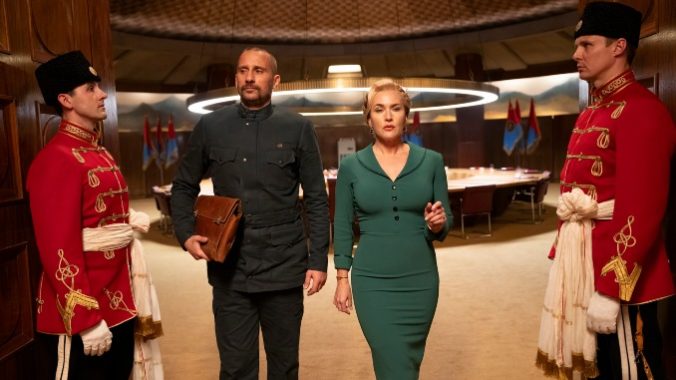The Regime Crumbles Under Uninspired Political Commentary and Weak Gags
Photo Courtesy of HBO
Political satire that’s any good always walks a tricky tightrope. It has to balance humor and messaging, poking fun at bureaucratic absurdities in a way that demonstrates it understands how these systems work while still maintaining a comedic edge. And if it’s a TV show, it can be even harder because they have to offer specific, pointed critiques about political ideologies without alienating a large swathe of potential viewers, at least according to the suits bankrolling these projects. A prime example is The Colbert Report, a pretty clear spoof on conservative talk show pundits that still proved popular among those it was making fun of because it made it easy for people to interpret its commentary through whatever lens they wanted.
The Regime, a farcical miniseries from HBO about a failing authoritarian state in Central Europe, mostly falls short of even reaching this blunted irony. While never entirely unwatchable, its cast of thin characters generally makes its drama uneffecting, and most of its points about political systems feel played out. Worse, its humor largely lacks a punch, relying on a constant hum of low-key ridiculousness that fails to go beyond vaguely amusing. This one may only be six episodes long, but like a leader refusing to concede after their term is up, it overstays its welcome.
The story begins as Corporal Herbert Zubak (Matthias Schoenaerts), a soldier who recently gunned down civilians at a protest, is whisked away to the government palace for an audience with the chancellor. A cadre of advisors make sardonic quips as they warn him about a long list of faux pas to avoid when meeting their leader, most of which involve avoiding popping her carefully-protected bubble. But despite the warning signs, when Zubak sees Chancellor Elena Vernham (Kate Winslet) for the first time, backlit by a golden halo, he’s immediately smitten, caught up in the mythology of their head of state. From there, the two begin a rocky relationship that threatens the balance of this failing administration as the country hurtles toward disaster.
If there’s a fundamental flaw in this series’ construction, it’s that it never finds a convincing, consistent tone. It’s stuck halfway between being a lukewarm comedy and inert drama, with humor that isn’t sharp enough to be truly cutting and heavier beats that are undermined by its tongue-in-cheek vibe. Both halves are constantly stumbling over the other, and although it successfully shifts towards grave material in its final episode… by that point, it’s too little too late.
As far as its humor goes, there is an occasional good line here and there, such as when one of the cynical members of the chancellor’s inner circle comments that an out-of-place Zubak looks like “a dog using a calculator” while struggling with a piece of technology. But for the most part, the show is more content with operating on a buzz of subdued farce, best embodied by Alexandre Desplat’s score, which accentuates these clownish circumstances through taunting accordions and other folk music flourishes.
Although this lack of sharp comedy could have worked if its more dramatic material had come together, attempts at weightier moments largely don’t land because these characters are caricatures. Chancellor Elena Vernham is likely the most ridiculous of the bunch, a hypochondriac despot who wavers between outwardly stern and deeply insecure. She’s best summed up by her lispy transatlantic accent, an intentionally grating affectation meant to represent her upbringing among the sheltered political elite. Winslet does a great job in the role, embodying the ludicrous reality that unreasonable people frequently control the levers of power. But even this performance can’t overcome the fact we’re asked to spend so much time with a character that would ultimately feel more at home as the butt of a joke in a one-off satirical comic strip than as the co-lead of a prestige TV series with hour-long episodes.
-

-

-

-

-

-

-

-

-

-

-

-

-

-

-

-

-

-

-

-

-

-

-

-

-

-

-

-

-

-

-

-

-

-

-

-

-

-

-

-








































